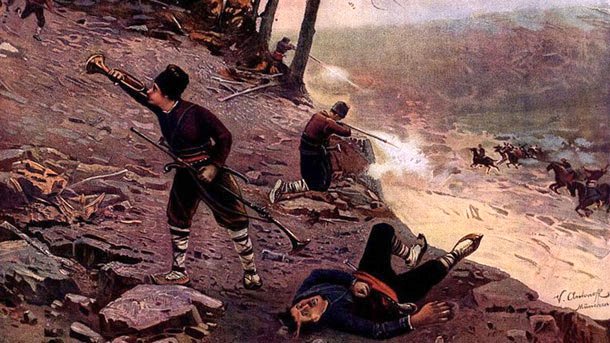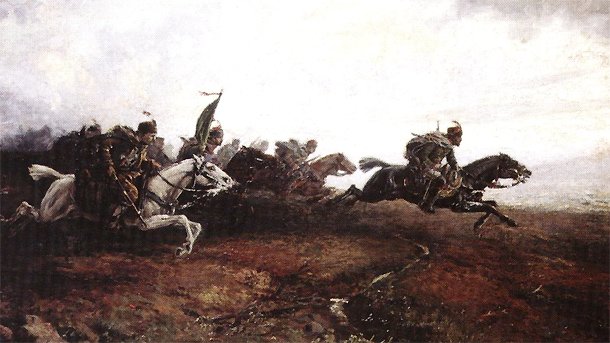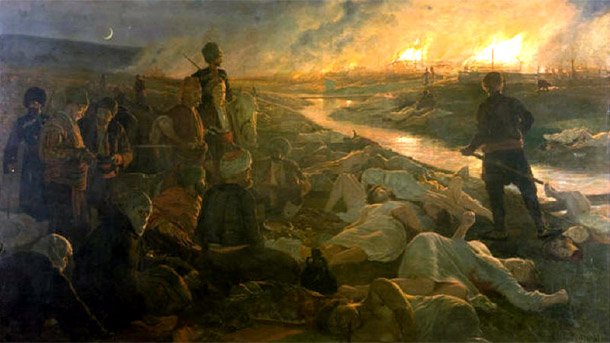
Bulgarian Rebels - painting by V. Antonov
Снимка: Архив
The April Uprising against the Ottoman Rule burst out 136 years ago on this date. It was organized by the Bulgarian Revolutionary Central Committee, established in the Romanian town of Giurgiu in 1875 by young emigrants Stefan Stambolov, Panayot Volov, Stoyan Zaimov, Nikola Obretenov and others. They decided to prepare an uprising on their own, seeing the political troubles of the Sublime Porte and the deepening of the Eastern Crisis. The idea was the Great Powers to interfere and to solve the Bulgarian national issue. The Giurgiu Committee separated the entire country into revolutionary districts – First /Tarnovo/, headed by Stefan Stambolov, Second /Sliven/, headed by Ilarion Dragostinov, Third /Vratsa/ - Stoian Zaimov, Forth /Plovdiv/ - Panaiot Volov, later replaced by Georgi Benkovski. No preparations for the uprising took place in the 5th /Sofia/ district due to different reasons.
The Flying Sqaud - the famous painting by Dimitar Guydjenov
The best organization was created in the 4th revolutionary district. On April 19 1876 a group of Turkish police officers was sent in the town of Koprivshtitsa and those had to arrest head of the local committee Todor Kableshkov. On April 20th people from the town attacked the local police station /konak/. The church bells rang, uniformed and armed people gathered in the streets and they all celebrated the first day of freedom. Special couriers headed to the town of Panagiurishte and the villages nearby to take the so-called Blood Letter, informing on the bursting of the rebellion. People in Panagiurishte joined the uprising on the very same day and Benkovski gathered a group of 200 horsemen, called Flying Squad. Those started to tour around the whole district and call on rebellion. Most of the settlements in the 4th district followed the appeal.
At first Turkish authorities were shocked, but later those sent military and irregular forces /Bashi-bazouk/, consisting of thousands troops. The town of Strelcha is taken first, followed by Klisura. On April 26th start heavy fights for Panagiurishte too, which is taken by the Turks 4 days later. Bratsigovo, Perushtitsa and Batak are captured too, as over 3,000 people are slaughtered or burnt alive in the latter.
© Photo: bg.wikipedia.org
The Batak Slaufgter - by Antoni Piotrovski
At the same time the Blood Letter doesn’t have the same result in the First and Second revolutionary districts. People in the First one decide to start their rebellion on April 28, but the authorities arrest many revolutionaries on the previous day. There is an uprising after all, but it is carried out mainly by several squads – the ones of Priest Hariton, Tsanko Diustabanov and Hristo Patrev. Their destiny is a tragic one, as they only survive for no more than ten days.
The squad of Stoil Chieftain near Sliven welcomes Ilarion Dragostinov and Georgi Obretenov, who both succeed in avoiding the arrests, carried out in the Second district. However, the squad is liquidated of May 13.
Activists from the Third district hesitate and decide to wait for the official date of the uprising, chosen earlier – May 11. At the same time they expect the coming of the squad of Hristo Botev that is expected to arrive from Romania. On May 17th the Radetzky ship is captured by the rebels from the squad and forced to stop at the Bulgarian bank of the Danube River near the town of Kozloduy. The squad fought many battles with Turkish military forces and reached the Balkan Range, but due to the lack of any support was smashed after Hristo Botev was shot dead on May 20.
Practically this is the end of the uprising that is covered with blood and fire. More than 30,000 men, women and children are murdered, 80 settlements are burnt down and over 200 are completely robbed. However, the international community reacts sharply to these atrocities. Turgenev, Dostoevsky, Victor Hugo, William Gladstone and many other public persons, artists, scientists, journalists and politicians all raised their voices in support of the Bulgarian cause. Despite the lack of success, the April Uprising turned into a challenge to the Ottoman Empire that it couldn’t overcome. A conference took place in Istanbul on the Bulgarian national issue, followed by the 1877-1878 Russo-Turkish War.
English version: Zhivko Stanchev
По публикацията работи: Dr. Radoslav Spasov
Последвайте ни и в
Google News Showcase, за да научите най-важното от деня!

